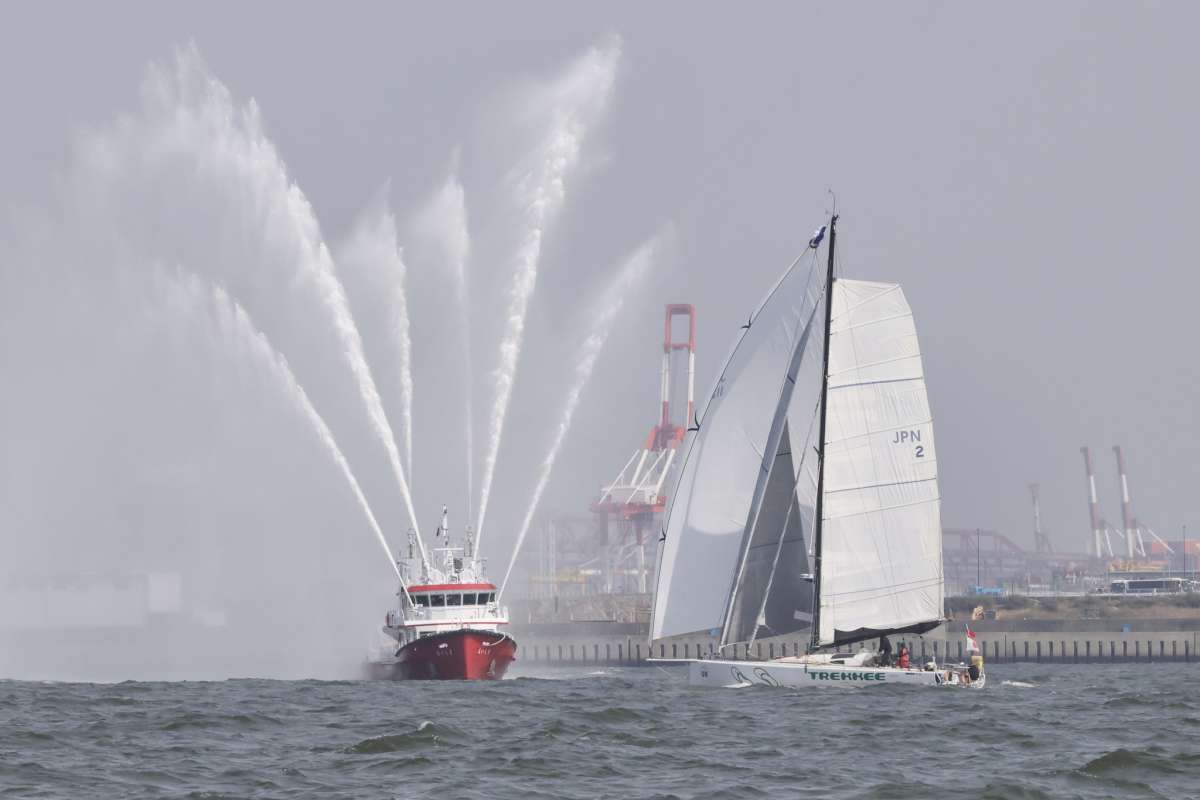Australia has the full set of medals at the Santander ISAF World Championships after Nathan Outteridge and Iain Jensen were pipped fro silver in the 49er class by mere millimetres. Their bronze complements the gold won yesterday in the 470 by Mat Belcher and Will Ryan and the silver won on the first day of finals by Tom Burton in the Laser.
The Kiwi pairing of Peter Burling and Blair Tuke have dominated the 49er class since finishing behind Nathan Outteridge and Iain Jensen (AUS) at the London Olympics. The Australians had some bad luck early in this regatta and stretched their sails during the day of mayhem when they were sent out in over 30 knots. But there were no excuses – the Kiwis are simply in a class of their own at present and there was simply nothing their former training partners could do about it.
With the gold medal already in their pocket – they finished the gold fleet with a massive 36 points lead over second-placed Jonas Warrer and Anders Thomsen (DEN) – the Kiwis could enjoy the experience of the medal race knowing they had won their second consecutive world title.
All interest centred on the battle for the minor medals, where the London 2012 Olympic champions Outteridge and Jensen were two points behind the Danish Beijing Olympic champions and just needed to beat them to take silver. Jorge Lima and Jose Costa of Portugal could also ruin the party – they were just nine points behind the Australians.
Prior to the race I heard that Outteridge's back was playing up again – the result of a serious car accident before the 2008 Olympics – owing to the long five-hour days he had spent out on the water while the race committee waited for breeze. The Australian spectators were crossing their fingers, hoping it would hold together for the 30 minutes required to get around the medal race course.
The start was a disaster for fellow Australians David Gilmour and Rhys Mara, who were over the line and had to return and re-start. But out ahead, predictably, the Kiwis used their boatspeed to blast away from the line and led by two boatlengths within only a hundred metres.
The Danes went left and got caught in some traffic but the Australians weren't in great shape either.
At the first top mark the Portuguese were making their intentions obvious and even snuck around ahead of the Kiwis. Gilmour and Mara had miraculously used their bad luck to effect, being forced the right way up the beat.
Outteridge and Jensen went right and the Danes, rounding almost at the same time, went left.
At the bottom mark the Kiwis and Portuguese split the gates, as did the Aussies and Danes. The Australians went right on port, hoping for the lift, while the Danes were in the heavy traffic going left. When they crossed, the Australians had a three boat length advantage – and promptly sailed into a hole. The next cross saw the Danes well in front and they rounded the mark in fourth, with the Australians buried down in eighth.
The Kiwis had vanished off the front by this stage and there was no doubt who would win the medal race as they swept through the gate at least 200 metres ahead of the Portuguese. Another course change was signalled.
The run had worked for the Australians, who had two boats between them and the Danes at the gate, and this time they covered, tacking across into the centre of the course. Gilmour and Mara slipped around the top mark a place in front of their countrymen and everyone was gybe-setting. The Danes were two places behind and the silver looked safe for Outteridge and Jensen.
The Kiwis won in a canter, ahead of Austria and GBR. The rest of the fleet swept down and the Aussies were forced into a late gybe. Suddenly the Danes were coming through with speed as Outteridge desperately tried to find some traction. Right on the line the Danish speed was the defining factor and, by millimetres, the snatched the silver medal.
Outteridge explained what happened: “We were covering, we gybed on their air then for 15 or 20 seconds it went light. The guys behind were carrying more pressure and they just got us on the line.”
He and Jensen both said that it was a shifty day that made picking the right spot difficult. “It went from 2 to 12 knots, so there was a lot of snakes and ladders,” Jensen reported. “We fluctuated anywhere from 3rd to 8th, we got a decent start, a good first part, then at one stage we were last.
There were no excuses from either sailor. Outteridge said his back was the least of his problems after Donna, the team physio, had worked on it for “about seven hours”.
“We didn't put the boat in the right position,” he said. “Once you're ahead like Pete and Blair it's easy, where we were it was a different race track.”
Jensen added: “Bronze is a little bit disappointing but the best boat at the event won it. We have to work on our consistency. We showed that in some races we can do well then on other days we sailed really badly. Apart from four races we had a pretty good week. That's where our gains will be.”
He said the pair will take a break now and then put some solid practice in at the start of summer before Sail Melbourne.
For David Gilmour and Rhys Mara it was a coming-of-age in the big fleets. They finished fourth in the medal race and seventh overall, to give them an edge when the AST starts looking for the next generation in this class.
49erFX
All the interest in the new women's skiff class centred on the battle for gold and silver. Italy's Giulia Conti and Francesca Clapcich were 22 points out of second place and 25 points ahead of fourth, so they were guaranteed the bronze.
But up front there was a real battle between Ida Nielsen/Marie Olsen (DEN) and Martine Grael/Kahena Kunze (BRA). With just two points separating the two countries, whichever beat the other would win – even if they were ninth and tenth across the line. Everyone expected a classic match race, with the rest of the fleet simply making up the numbers.
In the Brazilian coach boat the five-times Olympic medallist and sailing legend Torben Grael, Martine's father, was obviously nervous when interviewed by Shirley Robertson. Great sailors would rather be taking part than watching.
Martine was showing no nerves. She had the boat sitting patiently, not getting underway until 10 seconds before the gun. When it went, she snuck into a tiny gap between Spain and the start boat and immediately tacked onto port.
There were three Danish boats in the medal race and one immediately tacked and dropped down towards the Brazilians. It looked as though some illegal team racing might be about to break out, but the Brazilians lifted above the Danes and gassed them out of the equation.
However, as they approached the top mark and tacked onto starboard, it was obvious that the pressure was very light on the right-hand side and almost the entire fleet, including DEN 11, rounded ahead. The Brazilians were in eighth place and the gold medal looked out of reach.
It was Hughey the wind god who came to their assistance, sending slightly stronger winds down the course that allowed Brazil to close the gap. At the gate, the Danes were caught up behind a slow Swedish rounding and Brazil was within a boat length.
This time they went right while the Danes flirted with the left, and that was Denmark's undoing. Germany and the Netherlands were fighting a private war for the medal race points but Brazil was now safely in third and used the extra pressure to get out on the wire and make the FX fly.
Denmark managed to work up to fourth and finished on the same overall points, 41, as Brazil. But with the medal race as the tie-breaker, the Grael family managed to pocket yet another world championship gold medal.
– Roger McMillan in Santander
























